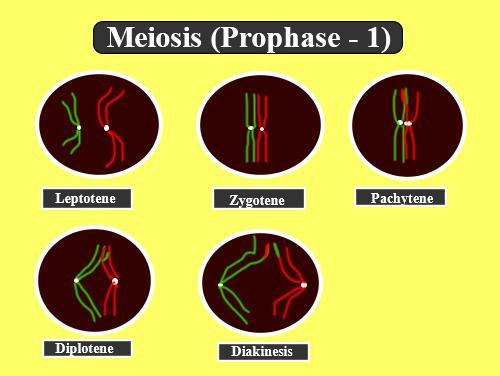
Assertion: During zygotene, chromosomes show a bivalent stage.
Reason: Bivalent is half the number of chromosomes.
(a) Both Assertion and Reason are correct and Reason is the correct explanation for Assertion
(b) Both Assertion and Reason are correct but Reason is not the correct explanation for Assertion
(c) Assertion is correct but Reason is incorrect
(d) Assertion is incorrect but Reason are correct
Answer
580.2k+ views
Hint: Zygotene is the second stage of the prophase of meiosis, throughout which homologous chromosomes begin to pair. Bivalent is a pair of homologous chromosomes.
Complete answer:
Assertion- During Zygotene, chromosomes show bivalent stage. We know that zygotene is a part of prophase I (meiosis).
Prophase I have five parts which are:
Leptotene chromatin are condense into chromosome
Zygotene formation of bivalent takes place between homologous chromosomes.
Pachytene cross over (exchange genetic information) process takes place.
Diplotene the complex form after crossover is degraded.
Diakinesis nuclear membrane degenerates and ends the prophase I.
From this we can clearly see that in zygotene, the formation of bivalent takes place. Therefore, Assertion is true that during zygotene, chromosomes show bivalent stage.

Reason: Bivalent is half the number of chromosomes.
It means that chromosomes double the number of bivalent. For eg- we have a total of four chromosomes, then we can say that we have two pairs of homologous chromosomes. The formation of bivalent is also in pairs. So, here the number of bivalent we have is two. That is they are half of the number of the chromosome. Therefore, the Reason is true that bivalent is half the number of chromosomes. But the Reason is not the correct explanation of the given assertion.
So, the correct answer is ‘Both Assertion and Reason are correct but Reason is not the correct explanation for Assertion’.
Note: Humans have 23 pairs of chromosomes, for a total of 46 chromosomes. Meiosis in humans is a division process that takes place in diploid cells (two sets of chromosomes) and divides into two haploid cells (ones single set of chromosomes).
Complete answer:
Assertion- During Zygotene, chromosomes show bivalent stage. We know that zygotene is a part of prophase I (meiosis).
Prophase I have five parts which are:
Leptotene chromatin are condense into chromosome
Zygotene formation of bivalent takes place between homologous chromosomes.
Pachytene cross over (exchange genetic information) process takes place.
Diplotene the complex form after crossover is degraded.
Diakinesis nuclear membrane degenerates and ends the prophase I.
From this we can clearly see that in zygotene, the formation of bivalent takes place. Therefore, Assertion is true that during zygotene, chromosomes show bivalent stage.

Reason: Bivalent is half the number of chromosomes.
It means that chromosomes double the number of bivalent. For eg- we have a total of four chromosomes, then we can say that we have two pairs of homologous chromosomes. The formation of bivalent is also in pairs. So, here the number of bivalent we have is two. That is they are half of the number of the chromosome. Therefore, the Reason is true that bivalent is half the number of chromosomes. But the Reason is not the correct explanation of the given assertion.
So, the correct answer is ‘Both Assertion and Reason are correct but Reason is not the correct explanation for Assertion’.
Note: Humans have 23 pairs of chromosomes, for a total of 46 chromosomes. Meiosis in humans is a division process that takes place in diploid cells (two sets of chromosomes) and divides into two haploid cells (ones single set of chromosomes).
Recently Updated Pages
Master Class 11 Computer Science: Engaging Questions & Answers for Success

Master Class 11 Business Studies: Engaging Questions & Answers for Success

Master Class 11 Economics: Engaging Questions & Answers for Success

Master Class 11 English: Engaging Questions & Answers for Success

Master Class 11 Maths: Engaging Questions & Answers for Success

Master Class 11 Biology: Engaging Questions & Answers for Success

Trending doubts
One Metric ton is equal to kg A 10000 B 1000 C 100 class 11 physics CBSE

There are 720 permutations of the digits 1 2 3 4 5 class 11 maths CBSE

Discuss the various forms of bacteria class 11 biology CBSE

Draw a diagram of a plant cell and label at least eight class 11 biology CBSE

State the laws of reflection of light

Explain zero factorial class 11 maths CBSE




